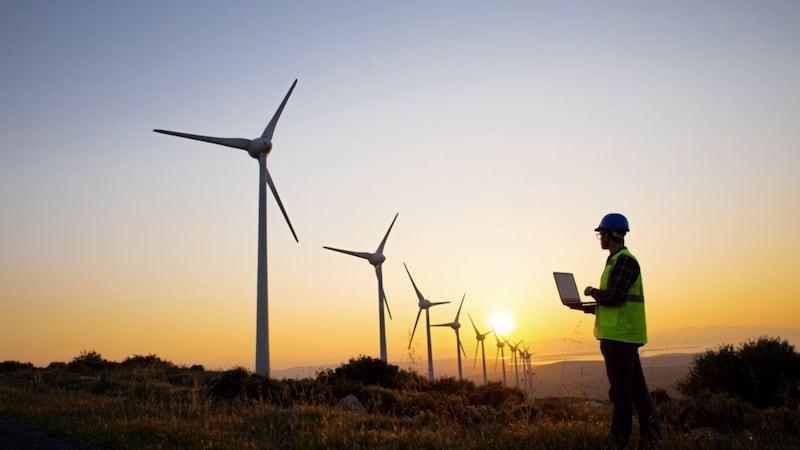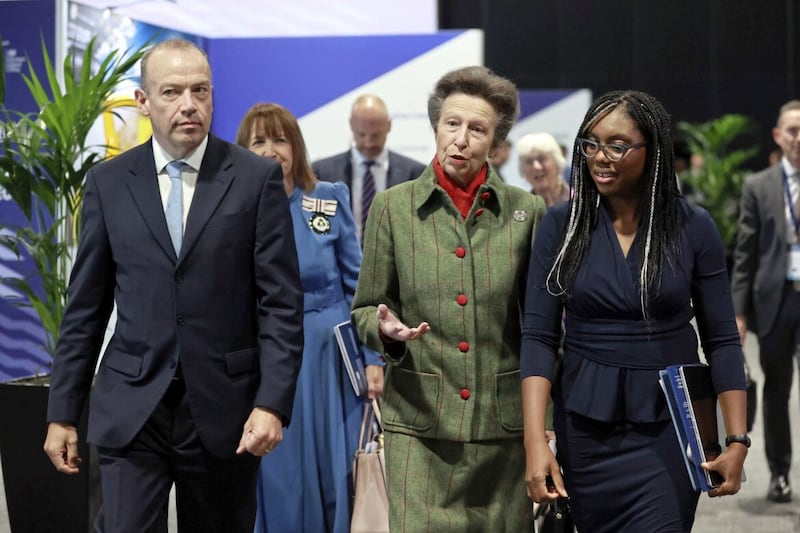SOMETIMES it’s only when we get hit with storms like Ciara, Dennis and Jorge that we start to have a full appreciation for the need to properly invest in our energy and water infrastructure. Our dependency on a secure supply of electricity, good flood defences and clean drinking water are generally taken for granted most of the year. It’s only when things go wrong that these utilities are given more serious consideration.
It’s widely agreed by scientists that climate change means extreme weather events are going to happen much more often and the devastation and disruption on both households and businesses will continue to mount. But on the upside, there is now huge momentum to do something about climate change.
The UK’s Climate Change Act which commits to a 100 per cent reduction in greenhouse gas emissions by 2050 is a push for progress. Scotland has also passed a Climate Change Act and Wales has set out its approach to cutting emissions in the ‘Prosperity for All: Low Carbon Wales’ plan. Last summer the Irish Government also published its Climate Action Plan which includes ambitious energy-related actions such as increased electricity from renewables, requirements for new buildings and a push on electric cars and vans.
So with the local Executive back, it's now time for Northern Ireland to declare our hand on how we will go about tackling the climate change issue.
In the New Decade, New Approach document there is a commitment to bring forward a Climate Change Act for Northern Ireland. Quite simply, what gets measured gets done and this Act will be important for setting out those much-needed targets for government, industry and the public to work towards.
Industry and the wider public must get involved in Northern Ireland’s transition to a zero emissions economy. The Department for the Economy (DfE) has launched a ‘Call for Evidence’ to inform the development of a new energy strategy for Northern Ireland. Widespread collaboration has been sought and the public as well as industry should feed in their views before March 20.
Currently our biggest contributors to emissions are agriculture, transport and power generation. However, it is important to note that Northern Ireland is by no means starting from scratch when it comes to reducing emissions. For example, there has already been work done by the UK Committee for Climate Change (CCC) on Northern Ireland’s emissions. The CCC have made specific recommendations on where Northern Ireland’s policy focus should be. Our focus must be on the energy used in heating our homes and buildings, transport and power.
When it comes to power in Northern Ireland, we have made great strides with the decarbonisation of electricity – with renewable sources now up to around 47 per cent. That progress must continue so that we can hit somewhere between 60 to 80 per cent of power generated from renewable sources by 2030.
But for that to happen, support mechanisms will be needed – good planning and grid connection are fundamental to success. The north-south interconnector has a huge role to play in helping us meet our renewable energy targets, while simultaneously the interconnector will ensure security of supply and reduced prices for customers.
With 67 per cent of homes in Northern Ireland still reliant on oil (which is high carbon intensity) for heating, consumer support for a transition to natural gas could provide immediate decarbonisation and cost benefits. Again, targets will be needed if we are to make that transition for home heating to happen and clear end-dates must be set for the installation of oil boilers in houses.
Although natural gas has medium emission intensity, we need to keep in mind that (unlike GB) Northern Ireland’s modern gas infrastructure could be used in the future for hydrogen gas - which can be produced in low carbon ways. Hopefully developments around hydrogen production and storage will unfold as policy direction incentivises investment in this area.
Decarbonising public transport and promoting the use of public transport is a clear winning strategy. Again, Northern Ireland is in a good place when it comes to research in this area. There is ambitious work going on with Translink and Wrightbus when it comes to hydrogen fuelled buses. Electric vehicles are also expected to solve a large part of the emissions problem.
But investment is currently needed in electric vehicle infrastructure as the current network of EV chargers in Northern Ireland requires upgrading and expansion. Industry can provide this infrastructure when public funds are limited – but industry needs an incentive to lay out such capital, so government and industry must work collaboratively if progress is to be made.
Finally, we all need to start taking energy efficiency with the seriousness it deserves. Efficiency measures will not only have a huge impact on decarbonisation targets but will also reduce household energy costs.
Whether it’s greater use public transport, design of new buildings, the retrofitting of homes or the take up of supportive technologies; this is one area that will deserve significant attention in the Department’s forthcoming energy strategy.
In summary, there is no single answer to carbon reduction and a mix of energy solutions and technological developments will be required by 2050. Reducing our carbon emissions is everyone’s business and collaboration and partnership will be key.
Governments must work across borders, with industry and with the public. The new economy minister is keen to hear your views, so that we can get this policy right. When we have good policy, that much-needed investment will follow.
:: Angela McGowan is director of CBI Northern Ireland. Follow her at @angela_mcgowan
:: Next week: Richard Ramsey







